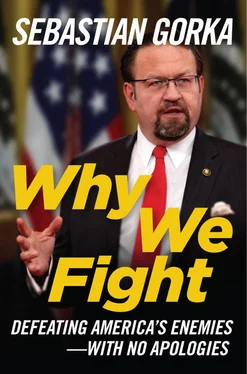Sebastian Gorka - Why We Fight - Why We Fight - Defeating America's Enemies - With No Apologies
Здесь есть возможность читать онлайн «Sebastian Gorka - Why We Fight - Why We Fight - Defeating America's Enemies - With No Apologies» весь текст электронной книги совершенно бесплатно (целиком полную версию без сокращений). В некоторых случаях можно слушать аудио, скачать через торрент в формате fb2 и присутствует краткое содержание. Город: Washington, Год выпуска: 2018, ISBN: 2018, Издательство: Regnery Publishing, Жанр: Политика, Публицистика, на английском языке. Описание произведения, (предисловие) а так же отзывы посетителей доступны на портале библиотеки ЛибКат.
- Название:Why We Fight: Why We Fight: Defeating America's Enemies - With No Apologies
- Автор:
- Издательство:Regnery Publishing
- Жанр:
- Год:2018
- Город:Washington
- ISBN:978-1-62157-640-2
- Рейтинг книги:5 / 5. Голосов: 1
-
Избранное:Добавить в избранное
- Отзывы:
-
Ваша оценка:
- 100
- 1
- 2
- 3
- 4
- 5
Why We Fight: Why We Fight: Defeating America's Enemies - With No Apologies: краткое содержание, описание и аннотация
Предлагаем к чтению аннотацию, описание, краткое содержание или предисловие (зависит от того, что написал сам автор книги «Why We Fight: Why We Fight: Defeating America's Enemies - With No Apologies»). Если вы не нашли необходимую информацию о книге — напишите в комментариях, мы постараемся отыскать её.
Why We Fight: Why We Fight: Defeating America's Enemies - With No Apologies — читать онлайн бесплатно полную книгу (весь текст) целиком
Ниже представлен текст книги, разбитый по страницам. Система сохранения места последней прочитанной страницы, позволяет с удобством читать онлайн бесплатно книгу «Why We Fight: Why We Fight: Defeating America's Enemies - With No Apologies», без необходимости каждый раз заново искать на чём Вы остановились. Поставьте закладку, и сможете в любой момент перейти на страницу, на которой закончили чтение.
Интервал:
Закладка:
It was love at first sight for both of us, and a year and half later, we were married. Soon children came, and then we went into business together, establishing the first independent think tank in Hungary dealing with national security issues and the challenges nations face when moving from dictatorship to democracy. God was good to us, as I was awarded back-to-back fellowships, first as a researcher at the NATO Defense College in Rome and then at Harvard’s Kennedy School of Government. After the fellowships, we returned to Hungary, at which point history interrupted.
I will remember forever what I was doing when the first plane hit the Twin Towers. I was sitting in a Budapest cafe preparing my notes for a college class I was to teach the next day when my phone rang. Although a private citizen at this point, I was still plugged into the national security world and was helping with a visit by members of the US intelligence community to the new Secret Services minster of the conservative Hungarian administration. The minster’s chief of staff was on the line, and he said, “Well I guess tomorrow’s meeting is off now.” When I asked what happened, he said to switch on a television.
My wife and I did not have cable because we had children and figured it was best not to. We still don’t, even though our children are grown now. It was a good decision. I rushed to the home of dear friends, an American diplomat and his wife who had cable in their apartment. My wife was already there, and along with most of the world, we watched the impact of the second plane and all the subsequent horrors of that Tuesday.
September 11, 2001 would change history, and it would change our lives. We watched Hungarian public television with consternation. As live CNN footage ran in the background, an anchorman who knew English translated the US coverage. Then my wife said something that would prove consequential: “You’re probably the only person in Hungary who speaks Hungarian and English and could speak meaningfully about this attack.” Indeed, I had served in a reserve military intelligence unit in the British Army and had been studying terrorism for a decade by that time, working on the issue at RAND and writing on it regularly for the British military publishing house, Janes. “Call up the TV station!” she said. I responded that life doesn’t work that way. I was wrong.
Our friends handed me the phonebook (remember that?), and at Katie’s insistence, I called the main number for the national broadcaster and asked for the duty editor. I told him who I was and my qualifications, and he asked me, “How fast can you get to the studio?” I said, “Forty minutes.” It wasn’t far away, but I was dressed casually and needed to go home to put on a suit. He replied, “If you’re here in thirty, we’re putting you on.” I sped home, made myself presentable, rushed to the beautiful headquarters of Hungarian TV, and spent the next six hours on live television, never before having been in front of a camera.
That’s how I became a household name in the land of my parents, as I spent the weeks and months after the 9/11 attacks appearing all over the media and analyzing what would become President’s Bush’s Global War on Terror. And because of that exposure, I was recognized by a retired Marine Corps legend who had his own post-9/11 mission.
Colonel Andrew Nichols Pratt, or Nick, had served with distinction with the marines as well as the CIA as a paramilitary working in Afghanistan against the Soviets in the 1980s. After retiring from active duty, he stayed with the Defense Department as a professor at the George C. Marshall Center in Garmisch-Partenkirchen, a Pentagon facility at the foot of the Alps in Bavaria. With his typical pragmatism, and long before anyone else came up with the catchy phrase, “It takes a network to defeat a network,” Nick realized that al-Qaeda was a globally diffused organization that would take a global partnership of new allies to win the war against global jihadism.
Thanks to that vision and the funding Nick acquired from the Office of the Assistant Secretary of Defense for Special Operations and Low-Intensity Conflict, Garmisch became the home to the Program on Terrorism and Security Studies, a six-week intensive course on the evolution of terrorism and how to defeat groups like al-Qaeda, which was open to senior counterterrorism professionals from around the world. Nick asked me to become a founding “plank holder” member of his faculty.
It was an incredible and glorious four years working with colonels and one-star generals from all over the planet—from Pakistan to Poland, from Trinidad and Tobago to Thailand—and I learnt a great deal from the intrepid men who were often already fighting jihadis on their own soil. But by 2008, I had a hankering.
Our classes always included a few American students, mostly Special Forces types, but also members of the Intelligence Community and the FBI. After a while, I found myself connecting to these brave souls and wanting to serve their broader community more specifically. Working for Nick had opened doors and seriously expanded my Rolodex, so in the spring of that year, I applied to be a professor to three American military institutions: West Point, the Virginia Military Institute, and the Defense Department’s highest educational institution, the National Defense University (NDU) in Washington, D.C. I visited all three locations and was duly impressed, but it was NDU, located on beautiful Fort McNair, one of our oldest bases, that offered me a position first. After fifteen years in Hungary with two small children, Katie and I upped sticks completely: I became a legal immigrant, fifty-two years after my parents had done the same.
That was a decade ago. Our children have grown up in America, and both Katie and I have made new careers for ourselves. Until 2016, mine revolved almost exclusively around the military, law enforcement, and intelligence. I spent almost six years at NDU, ending up as associate dean for congressional affairs and relations to the Special Forces community. At the same time, I taught with increasing frequency for the Joint Special Operations University at US Special Operations Command in Florida and for the John F. Kennedy Special Warfare Center and School in Fort Bragg, home to the Green Berets. After a few years, Katie and I established our own company to provide specialized education and analysis to the US government, specifically on the evolution of al-Qaeda and new groups like ISIS. Our company became the exclusive external provider of congressionally-mandated counterterrorism training to the FBI, and we ran a multi-year project on irregular warfare for US Army Special Operations Command. Then, I received a call from Trump Tower. Some of the details of this story you will find out in my interview about with Dave Rubin. But not all of them!
It was the summer of 2015, and I was no longer in government service. In addition to running our company, I held a privately-endowed teaching position at the Marine Corps University, Quantico, the corps’ own version of NDU. As the occupant of the Major General Matthew C. Horner Chair of Military Theory, I was teaching at the various schools on the Quantico complex, including the Command and Staff College—which Colonel Pratt had once commanded—the War College, and the Enlisted and Captains schools. It was a career pinnacle. But then, Corey Lewandowski called my cell phone and said that “candidate Trump” would like to meet me.
The future president was preparing for a big Republican debate on national security, and he wanted someone to advise him on key issues, such as defeating ISIS. Would I come to Trump Tower to meet him? Of course, I would.
I flew to New York, and the three of us met in Donald Trump’s office. In the midst of a wide-range discussion about all kinds of issues, Mr. Trump stopped in the middle of a sentence, turned to Corey, and said, “I like this guy! Let’s hire him!” Pure Trump. And that’s how I became a consultant to the future president of the United States. Over the next few months, I would also get to know General Mike Flynn, and before the election, I was made a member of the official National Security Council Transition Team. And then, we won.
Читать дальшеИнтервал:
Закладка:
Похожие книги на «Why We Fight: Why We Fight: Defeating America's Enemies - With No Apologies»
Представляем Вашему вниманию похожие книги на «Why We Fight: Why We Fight: Defeating America's Enemies - With No Apologies» списком для выбора. Мы отобрали схожую по названию и смыслу литературу в надежде предоставить читателям больше вариантов отыскать новые, интересные, ещё непрочитанные произведения.
Обсуждение, отзывы о книге «Why We Fight: Why We Fight: Defeating America's Enemies - With No Apologies» и просто собственные мнения читателей. Оставьте ваши комментарии, напишите, что Вы думаете о произведении, его смысле или главных героях. Укажите что конкретно понравилось, а что нет, и почему Вы так считаете.












